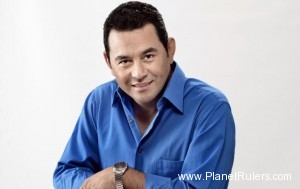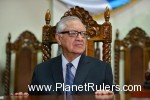Alejandro Giammattei, President of Guatemala (since Aug 11, 2019)

Alejandro Giammattei has been married to Rosana Cáceres since February 11 1989, and they have three children: Marcela, Estéfano and Alejandro Giammattei.
He cites Mahatma Gandhi as his most admired world figure.
Giammattei suffers from multiple sclerosis and uses crutches in order to walk.
Source: https://en.wikipedia.org/wiki/Alejandro_Giammattei
Jimmy Morales, Former President of Guatemala (elected on Oct 25, 2015. Wins 67.4% of the vote. Turnout is 56.3%)

Morales rose to fame as a TV comedian, starring in the series Moralejas (“Morals”) alongside his brother Sammy. In 2011, he ran as mayoral candidate in Mixco for the small right-wing Action for National Development party. In 2013, he joined the small National Convergence Front (FCN/Nation) and became its secretary-general.
In 2015 he was nominated as the FCN’s presidential candidate. He was initially considered an outsider but surprisingly finished first in the first round of the election, qualifying for the runoff. He runs on a platform of conservative values and against corruption. His slogan is “Neither corrupt nor a thief” (Ni corrupto, ni ladrón). He identifies as a nationalist, supports the death penalty and opposes abortion. Moreover, he denies that a genocide against the Ixil Maya took place. Morales’ success came after both former vice president Roxana Baldetti and outgoing president Otto Pérez Molina had to step down and were arrested on fraud and corruption charges (La Linea corruption case). His success was viewed as a sign of the distrust of many Guatemalans towards the traditional political elite.
Morales is married and has four children.
Source: https://en.wikipedia.org/wiki/Jimmy_Morales_(politician)
Alejandro Maldonado Aguirre, Acting President of Guatemala (since Sept 2, 2015)
Alejandro Maldonado Aguirre (born January 6, 1936) is a Guatemalan politician who is the Acting President of Guatemala, following the Congress of Guatemala’s acceptance of the resignation of President Otto Pérez Molina on September 3, 2015.
He was elected as Vice President by Congress on May 14, 2015, after his predecessor, Roxana Baldetti, resigned amid allegations of corruption. Before becoming Vice President, he served as a constitutional judge, congressional deputy, ambassador to the United Nations, and political leader, including a failed presidential bid in 1982. He was Minister of Education from 1970 to 1974 and Minister of Foreign Affairs from 1995 to 1996.
Born in Guatemala City, Maldonado graduated from San Carlos University with a degree in law.
Since the 1960s, he was a member of the far-right National Liberation Movement political party (Movimiento de Liberacion Nacional or MLN), alleged to have started the use of death squads against communists. He was also Minister of Education under the military regime of Arana Osorio (1970–1974) and defended Guatemala before the United Nations when the international community isolated the military regime of Lucas García (1978–1982) for its gross human rights violations.
Later, Maldonado served as a judge on the Constitutional Court judge on three occasions, where he was responsible for several controversial decisions. In May 2013 Maldonado was judge on the appeal case of former president Efraín Ríos Montt’s conviction for genocide. Whereas in the first session Ríos Montt was found guilty, Maldonado and two others of the five-person Constitutional Court annulled the proceedings.
One week after his appointment as Vice President in May 2015, protesters sought his resignation because he had overturned the guilty verdict in the Ríos Montt trial.
Source: https://en.wikipedia.org/wiki/Alejandro_Maldonado
Otto Pérez Molina, Former President of Guatemala (since Jan 14, 2012. Resigned on Sept 2, 2015)

Pérez is a graduate of Guatemala’s National Military Academy (Escuela Politécnica), the School of the Americas and of the Inter-American Defense College. During his time in the army he served in the notoriously brutal special forces (known as the Kaibiles), as director of military intelligence, and inspector-general of the army. In 1983 he was a member of the group of army officers who backed Defence Minister Óscar Mejía’s coup d’état against de facto president Efraín Ríos Montt. While serving as chief of military intelligence in 1993, he was instrumental in forcing the departure of President Jorge Serrano after Serrano attempted a “self-coup” by dissolving Congress and appointing new members to the Guatemalan Supreme Court. In the wake of that incident, Guatemala’s human rights ombudsman, Ramiro de León Carpio, became president and appointed Pérez as his presidential chief of staff, a position he held until 1995. Considered a leader of the Guatemalan Army faction that favored a negotiated resolution of the 30-year-long Civil War, Perez represented the military in the negotiations with guerrilla forces that led to the 1996 Peace Accords. Between 1998 and 2000 he represented Guatemala on the Inter-American Defense Board.
General Pérez retired from active military duty in January 2000.
On 24 February 2001, he founded the Patriotic Party. In the general election of 9 November 2003, the PP aligned itself with two other parties in the Grand National Alliance and Pérez was elected to Congress as a national-list congressman.
He was the candidate of the Patriotic Party in the 2007 presidential election, campaigning under the slogan “Mano dura, cabeza y corazón” (“Firm hand, head and heart”), advocating a hard-line approach to rising criminality in the country. After receiving the second-largest number of votes in the initial contest on 9 September, he ultimately lost the election to Álvaro Colom of the National Unity of Hope in the second round on 4 November 2007.
In November 2011, he was elected president with 54% of the vote. Pérez is the first former military official to be elected to the presidency since Guatemala’s return to democratic elections in 1986.
On 11 November 2000, Pérez’s son, Otto Pérez Leal, was attacked by gunmen while driving with his wife and infant daughter. On 21 February 2001, three days before Pérez was scheduled to launch his new political party, masked gunmen attacked and wounded his daughter Lissette. The same day, masked gunmen shot and killed Patricia Castellanos Fuentes de Aguilar, who had just departed her house after meeting with Pérez’s wife, Rosa María Leal. Human rights groups claimed that the attacks were politically motivated.
During the 2007 presidential campaign, several members of the Patriotic Party were killed by armed assailants, including a 33-year-old indigenous woman, Aura Marina Salazar Cutzal, who was secretary to the party’s congressional delegation and assistant to Pérez.
Alvaro Colom Caballeros, Former President of Guatemala
Álvaro Colom Caballeros (born 15 June 1951 in Guatemala City) is the President of Guatemala for the 2008-2012 term. He is the leader of the social-democratic National Union of Hope (UNE).
Early years
Colom is the son of Antonio Colom Argueta and Yolanda Caballeros Ferraté, being the fourth of five siblings. Manuel Colom, a former mayor of Guatemala City who was killed by the military in 1979 just after the creation of his political party was approved, was his paternal uncle. He is also the father of Antonio Colom Szarata, the bass player of Guatemalan rock band Viento en Contra. Previously widowed and divorced, he is now married to his third wife, Sandra Torres.
After gaining a degree as an industrial engineer at the University of San Carlos (USAC) he became a businessman involved in a variety of businesses, and a government civil servant, including being the founding General Director of the Fondo Nacional para la Paz and Vice Minister of the Economy before turning to politics. Representing the UNE (Unidad Nacional de la Esperanza) in the 2003 presidential elections he came second in the first round on 9 November, and then lost to Óscar Berger in the second round on 28 December, with the best showing of a left-wing candidate in almost 50 years.
Guatemala 2007 election
Main article: Guatemalan general election, 2007
He was one of the two candidates to reach the second stage of the 2007 presidential election on 9 September 2007 along with Partido Patriota candidate Otto Pérez Molina. At 10:00 p.m. local time on election night, Colom was declared the newly elected president by over five percentage points, 52.7% to 47.3%, with over 96% of polling places counted, becoming Guatemala’s first left-leaning president in 53 years.
Support for Colom by middle and upper classes supposedly dropped after he was accused of receiving money from state funds to finance a small part of his political campaign for the presidential election of 2003. The funds for which he was accused were actually a payment for a service that Fundación de Amigos del País, an NGO supportive of UNE, got from one of the government institutions and later donated the Q500,000 to UNE. Later the charges were dropped for lack of evidence against him. Colom has denied all charges and has claimed to be a victim of political persecution and also returned the money he received from Fundación de Amigos en Acción.
Colom has said that he wants to reduce crime by tackling poverty in Guatemala.
Óscar José Rafael Berger Perdomo, Former President of Guatemala
Óscar José Rafael Berger Perdomo, born on 11 August 1946 in Guatemala City, is the current President of Guatemala.
His family was a part of the upper class with large sugar and coffee holdings. He graduated in law from the private, Jesuit Rafael Landívar University. In 1967 he married Wendy Widmann, also from a land owning Guatemalan family. From the mid seventies he ran a successful skittles parlor. In 1985 he joined Álvaro Arzú’s successful campaign to become mayor of Guatemala City. From January 1991 to June 1999, he was mayor himself.
In the general election held on 9 November 2003, Berger was candidate for the conservative Grand National Alliance after being persuaded out of a retirement spent farming to return to politics. He obtained 34% of the votes, putting him well ahead of Álvaro Colom of the National Union of Hope (26%) and former president Efraín Ríos Montt of the Guatemalan Republican Front (19%).
A run-off vote between Berger and Colom took place on 28 December 2003, which Berger won with a 54% share of the vote. He was sworn in on 14 January 2004.



